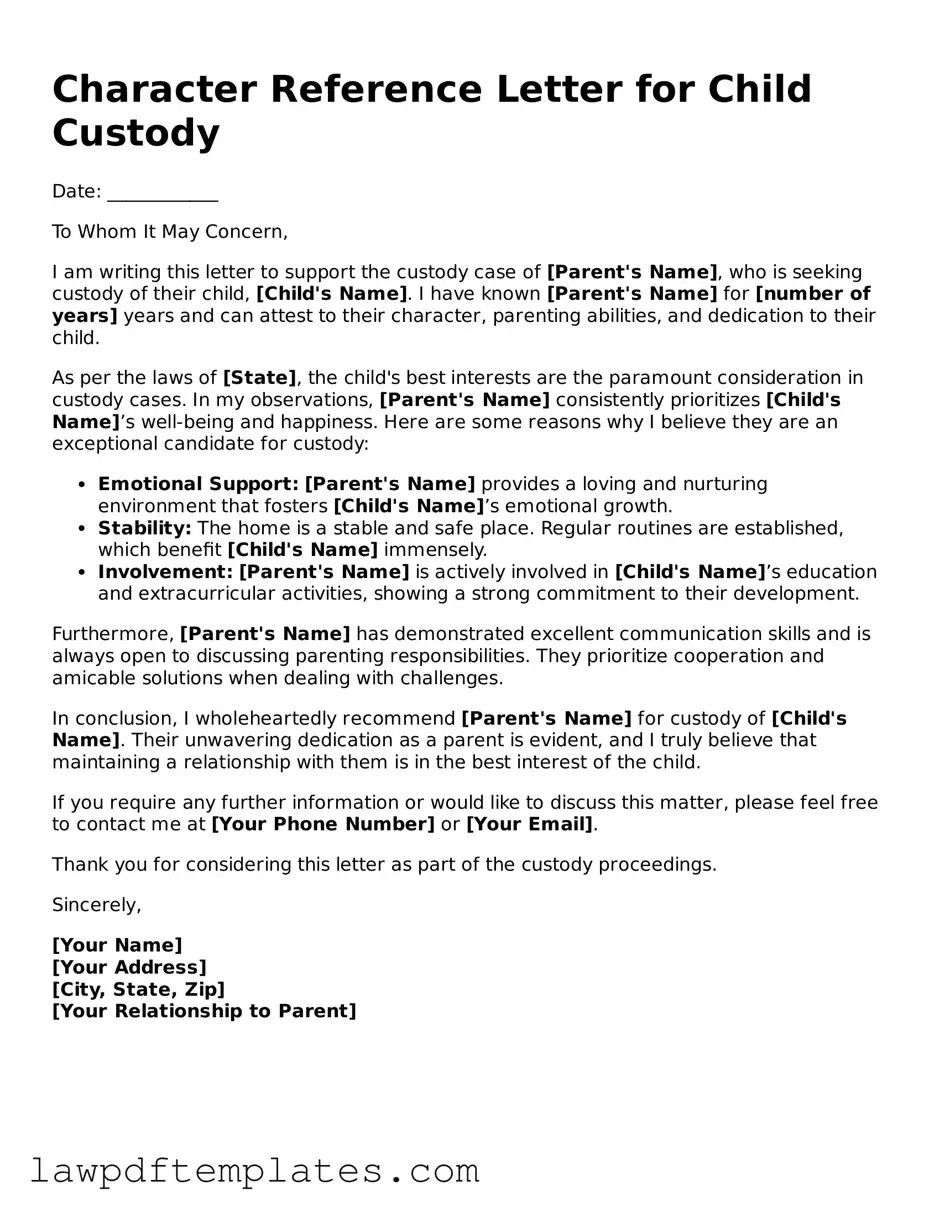Attorney-Approved Character Reference Letter for Child Custody Document
Form Breakdown
| Fact Name | Description |
|---|---|
| Purpose | A Character Reference Letter for Child Custody is used to provide insight into a parent's character and suitability for custody. |
| Who Can Write | Friends, family members, teachers, or community leaders can write these letters, as long as they know the parent and child well. |
| Content Requirements | The letter should include specific examples of the parent's behavior, relationship with the child, and overall character. |
| Length | Typically, a character reference letter should be one to two pages long, providing enough detail without being overly lengthy. |
| Format | The letter should be formatted formally, including the writer's contact information, date, and a respectful salutation. |
| State-Specific Forms | Some states may have specific guidelines or forms for character reference letters. Always check local court rules. |
| Submission | The letter must be submitted to the court as part of the custody case, often during hearings or as evidence. |
| Governing Laws | In many states, family law governs custody decisions. For example, California Family Code Section 3011 emphasizes the child's best interests. |
Sample - Character Reference Letter for Child Custody Form
Character Reference Letter for Child Custody
Date: ____________
To Whom It May Concern,
I am writing this letter to support the custody case of [Parent's Name], who is seeking custody of their child, [Child's Name]. I have known [Parent's Name] for [number of years] years and can attest to their character, parenting abilities, and dedication to their child.
As per the laws of [State], the child's best interests are the paramount consideration in custody cases. In my observations, [Parent's Name] consistently prioritizes [Child's Name]’s well-being and happiness. Here are some reasons why I believe they are an exceptional candidate for custody:
- Emotional Support: [Parent's Name] provides a loving and nurturing environment that fosters [Child's Name]’s emotional growth.
- Stability: The home is a stable and safe place. Regular routines are established, which benefit [Child's Name] immensely.
- Involvement: [Parent's Name] is actively involved in [Child's Name]’s education and extracurricular activities, showing a strong commitment to their development.
Furthermore, [Parent's Name] has demonstrated excellent communication skills and is always open to discussing parenting responsibilities. They prioritize cooperation and amicable solutions when dealing with challenges.
In conclusion, I wholeheartedly recommend [Parent's Name] for custody of [Child's Name]. Their unwavering dedication as a parent is evident, and I truly believe that maintaining a relationship with them is in the best interest of the child.
If you require any further information or would like to discuss this matter, please feel free to contact me at [Your Phone Number] or [Your Email].
Thank you for considering this letter as part of the custody proceedings.
Sincerely,
[Your Name]
[Your Address]
[City, State, Zip]
[Your Relationship to Parent]
Common mistakes
When filling out a Character Reference Letter for Child Custody, individuals often make several common mistakes that can impact the effectiveness of their letter. One frequent error is failing to provide specific examples. Instead of making general statements about a parent’s character, it’s important to include detailed anecdotes that illustrate their parenting skills and relationship with the child.
Another mistake is using overly complex language. While it’s essential to sound professional, using jargon or complicated phrases can confuse the reader. A clear and straightforward writing style is more effective in conveying the intended message. Keeping the language simple ensures that the letter is easily understood.
People sometimes overlook the importance of addressing the letter to the right person. Not specifying the recipient can lead to delays or misunderstandings. Always ensure that the letter is directed to the appropriate individual or agency involved in the custody case.
Additionally, some may forget to include their own qualifications. The letter should state the writer’s relationship to the parent and how long they have known them. This context helps establish credibility and gives weight to the reference being provided.
Another common mistake is failing to proofread the letter. Spelling and grammatical errors can detract from the professionalism of the document. Taking the time to review and edit the letter can make a significant difference in how it is perceived.
Some individuals might also write a letter that is too long or too short. A well-balanced letter should be concise yet thorough. It should provide enough information to be meaningful without overwhelming the reader with unnecessary details.
Lastly, people sometimes forget to express their genuine feelings. A heartfelt letter that reflects true emotion can resonate more with the reader. It’s important to convey sincerity, as this can strengthen the overall impact of the reference.
Consider Popular Types of Character Reference Letter for Child Custody Documents
Adoption Recommendation Letter - Contribute your voice to the conversation surrounding adoptive families with this form.
A Recommendation Letter form is a structured document used to gather details and endorsements for an individual's qualifications and character. It facilitates the process of compiling feedback from various sources, such as educators, employers, or peers. By standardizing this information, the form enhances the reliability and consistency of recommendation letters. For those looking to create effective recommendation letters, templates like Fast PDF Templates can be invaluable resources.
Sorority Recommendation Letter for Someone You Don T Know - This form allows you to communicate your personal experiences with the candidate.
Letter of Recommendation Nursing - The candidate advocates for patients' rights and needs in all aspects of care.
